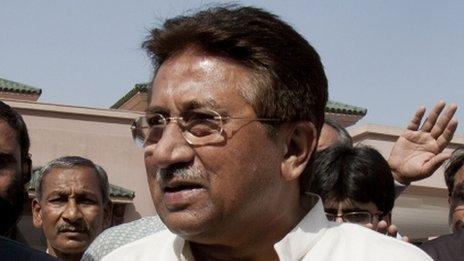Pakistan: Former President Pervez Musharraf speaks out
- Published
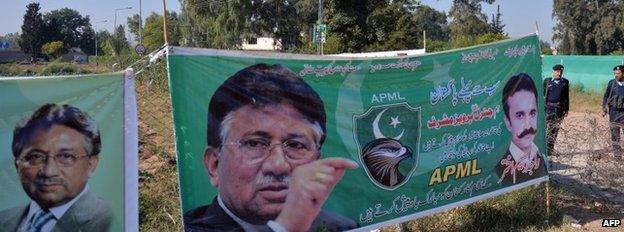
Former President Musharraf remains confined to his Islamabad residence
Former Pakistani military ruler Pervez Musharraf has spoken publicly for the first time since he was put under house arrest earlier this year.
In interviews given to two television channels on Thursday night, he defended his actions during his nine-year rule.
The former president faces charges of murder and restricting the judiciary.
He has been granted bail in all cases, but has been summoned to a court hearing next week to face another charge of high treason.
Mr Musharraf has remained confined to his residence in Islamabad because of security concerns. He is on a list of individuals not allowed to travel abroad.
The treason accusation relates to his decision in 2007 to impose emergency rule shortly before the Supreme Court was due to decide on the legality of his re-election as president while still being head of the army.
"I will inshallah (God willing) get out of this pressure because I am pretty sure I did not commit any wrong thing. Whatever I did was for the betterment and welfare of Pakistan and its people," he told Pakistan's private ARY television channel.
"I will face all cases... I will not run away,"
Resurgent judiciary
Gen Musharraf seized power in a military coup in 1999, and remained president until 2008 when a democratically-elected government forced him to resign.
He went into exile soon afterwards, apparently to avoid possible imprisonment by a resurgent judiciary whose judges he had sacked during his rule.
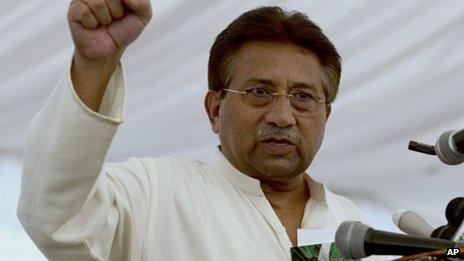
Pervez Musharraf could face the death penalty if convicted of treason
He also faced threats from Pakistani militants who blamed him for ordering the storming of Islamabad's Red Mosque in 2007 in which more than 100 people, many of them militants, were killed.
He returned to the country in March to stand in elections, but was barred from contesting by the courts.
Soon afterwards he was put under house arrest on a slew of charges, including the murder of former Prime Minister Benazir Bhutto, the killing of a tribal Baloch politician, placing judges under house arrest and ordering the Red Mosque operation.
In his first television appearance in months, Mr Musharraf defended himself against those charges and the treason allegations.
Correspondents say that so far the cases against him have proceeded slowly, veering from adjournment to adjournment with little clear progress apart from the granting of bail.
In November the government ordered the 70-year-old to appear before a special court on 24 December to face the treason charges. The BBC's M Ilyas Khan in Islamabad says that it will be the first time in Pakistan's history that a former military ruler will face trial for treason.
But Mr Musharraf said on Thursday that he was ready to face the trial.
"These are all [fraudulent] cases which lack any substantial evidence," he said.
"Whatever I did, I did for the people of Pakistan keeping the state's best interests in mind," he said.
The former president also spoke about the Taliban threat, saying unless terrorism was controlled Pakistan would neither see investment nor a sound economy.
"The Taliban are our people so we should speak to them, but we shouldn't beg them," he said.
- Published17 November 2013
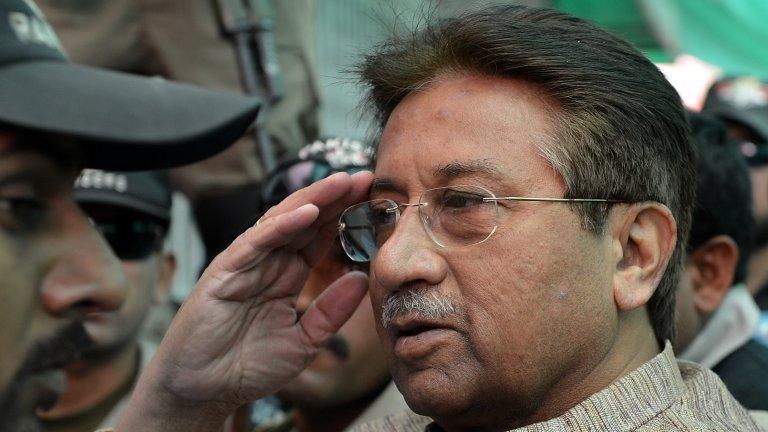
- Published7 November 2013

- Published13 January 2020
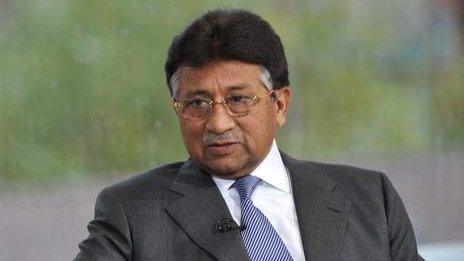
- Published19 April 2013
